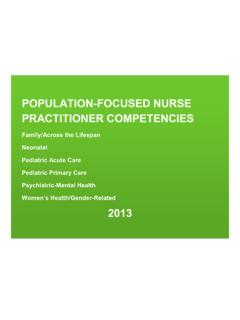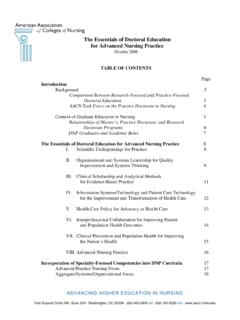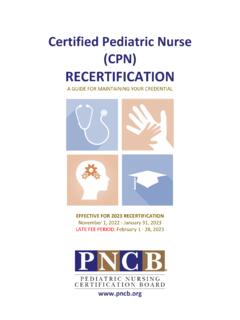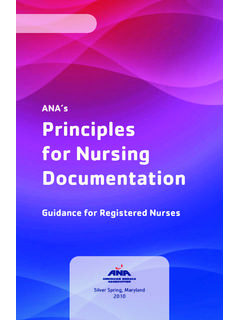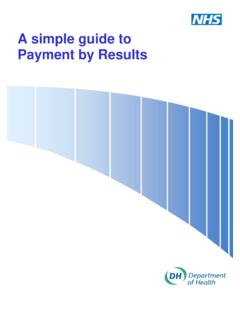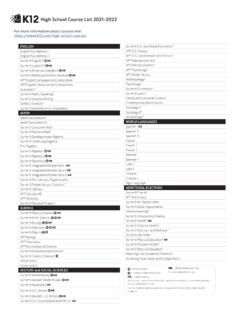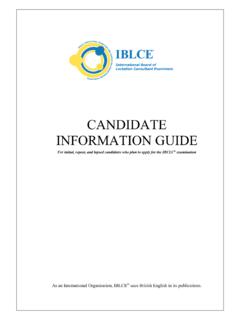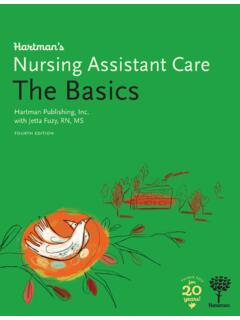Transcription of NURSE PRACTITIONER CORE COMPETENCIES April 2011 …
1 NONPF - 1 NURSE PRACTITIONER CORE COMPETENCIES April 2011 Amended 2012* Task Force Members Anne C. Thomas, PhD, ANP-BC, GNP - Chair M. Katherine Crabtree, DNSc, FAAN, APRN-BC Kathleen R. Delaney, PhD, PMH-NP Mary Anne Dumas, PhD, RN, FNP-BC, FAANP Ruth Kleinpell, PhD, RN, FAAN, FCCM M. Cynthia Logsdon, PhD, WHNP-BC, FAAN Julie Marfell, DNP, FNP-BC, FAANP Donna G. Nativio, PhD, CRNP, FAAN Note: Terms in bold are defined within the glossary found at the end of the COMPETENCIES . Preamble In August 2008, NONPF endorsed the evolution of the Doctorate of Nursing Practice (DNP) as the entry level for NURSE PRACTITIONER (NP) practice (NONPF, 2008a).
2 NURSE PRACTITIONER education, which is based upon the NONPF COMPETENCIES , recognizes that the student s ability to show successful achievement of the NONPF COMPETENCIES for NP education is of greater value than the number of clinical hours the student has performed (NONPF, 2008b). The NURSE PRACTITIONER Core COMPETENCIES (NP Core COMPETENCIES ) integrate and build upon existing Master s and DNP core COMPETENCIES and are guidelines for educational programs preparing NPs to implement the full scope of practice as a licensed independent PRACTITIONER . The COMPETENCIES are essential behaviors of all NPs.
3 These COMPETENCIES are demonstrated upon graduation regardless of the population focus of the program and are necessary for NPs to meet the complex challenges of translating rapidly expanding knowledge into practice and function in a changing health care environment. NURSE PRACTITIONER graduates have knowledge, skills, and abilities that are essential to independent clinical practice. The NP Core COMPETENCIES are acquired through mentored patient care experiences with emphasis on independent and interprofessional practice; analytic skills for evaluating and providing evidence-based, patient centered care across settings; and advanced knowledge of the health care delivery system.
4 Doctorally-prepared NPs apply knowledge of scientific foundations in practice for quality care. They are able to apply skills in technology and information literacy, and engage in practice inquiry to improve health outcomes, policy, and healthcare delivery. Areas of increased knowledge, skills, and expertise include advanced communication skills, collaboration, complex decision making, leadership, and the business of health care. The COMPETENCIES elaborated here build upon previous work that identified knowledge and skills essential to DNP COMPETENCIES (AACN 1996; AACN, 2006; NONPF & National Panel, 2006) and are consistent with the recommendations of the Institute of Medicine s report, The Future of Nursing (IOM, 2011).
5 At completion of the NP program, the NP graduate possesses the nine (9) core COMPETENCIES regardless of population focus. * Amended as result of additional validation through the 2011-2012 Population-Focused COMPETENCIES Task Force. COMPETENCIES 7, 6, & 7 added to Leadership, Practice Inquiry, Health Care Delivery Systems core, respectively, to reflect that they cross all populations. NONPF - 2 NURSE PRACTITIONER Core COMPETENCIES Scientific Foundation COMPETENCIES 1. Critically analyzes data and evidence for improving advanced nursing practice. 2. Integrates knowledge from the humanities and sciences within the context of nursing science.
6 3. Translates research and other forms of knowledge to improve practice processes and outcomes. 4. Develops new practice approaches based on the integration of research, theory, and practice knowledge Leadership COMPETENCIES 1. Assumes complex and advanced leadership roles to initiate and guide change. 2. Provides leadership to foster collaboration with multiple stakeholders ( patients, community, integrated health care teams, and policy makers) to improve health 3. Demonstrates leadership that uses critical and reflective thinking. 4. Advocates for improved access, quality and cost effective health care.
7 5. Advances practice through the development and implementation of innovations incorporating principles of change. 6. Communicates practice knowledge effectively both orally and in writing. 7. Participates in professional organizations and activities that influence advanced practice nursing and/or health outcomes of a population focus. Quality COMPETENCIES 1. Uses best available evidence to continuously improve quality of clinical practice. 2. Evaluates the relationships among access, cost, quality, and safety and their influence on health care. 3. Evaluates how organizational structure, care processes, financing, marketing and policy decisions impact the quality of health care.
8 4. Applies skills in peer review to promote a culture of excellence. 5. Anticipates variations in practice and is proactive in implementing interventions to ensure quality. NONPF - 3 Practice Inquiry COMPETENCIES 1. Provides leadership in the translation of new knowledge into practice. 2. Generates knowledge from clinical practice to improve practice and patient outcomes. 3. Applies clinical investigative skills to improve health outcomes. 4. Leads practice inquiry, individually or in partnership with others. 5. Disseminates evidence from inquiry to diverse audiences using multiple modalities.
9 6. Analyzes clinical guidelines for individualized application into practice Technology and Information Literacy COMPETENCIES 1. Integrates appropriate technologies for knowledge management to improve health care. 2. Translates technical and scientific health information appropriate for various users needs. 2a). Assesses the patient s and caregiver s educational needs to provide effective, personalized health care. 2b). Coaches the patient and caregiver for positive behavioral change. 3. Demonstrates information literacy skills in complex decision making. 4. Contributes to the design of clinical information systems that promote safe, quality and cost effective care.
10 5. Uses technology systems that capture data on variables for the evaluation of nursing care. Policy COMPETENCIES 1. Demonstrates an understanding of the interdependence of policy and practice. 2. Advocates for ethical policies that promote access, equity, quality, and cost. 3. Analyzes ethical, legal, and social factors influencing policy development. 4. Contributes in the development of health policy. 5. Analyzes the implications of health policy across disciplines. 6. Evaluates the impact of globalization on health care policy development. NONPF - 4 Health Delivery System COMPETENCIES 1.
